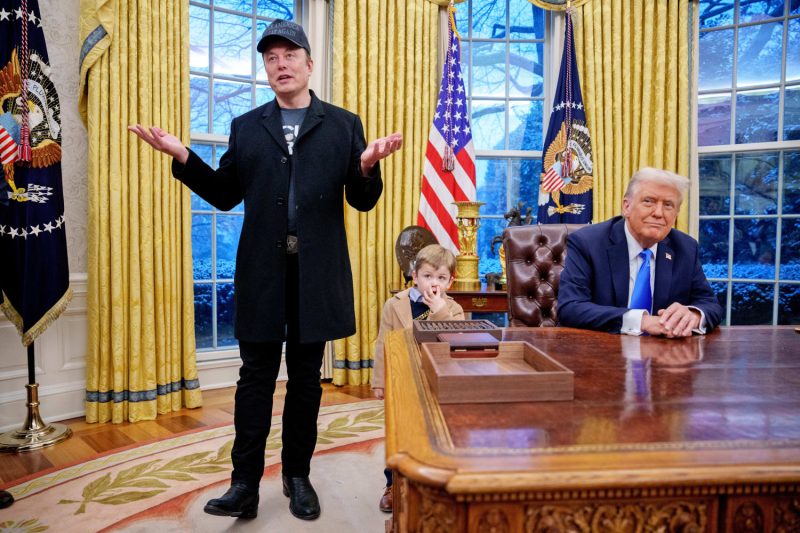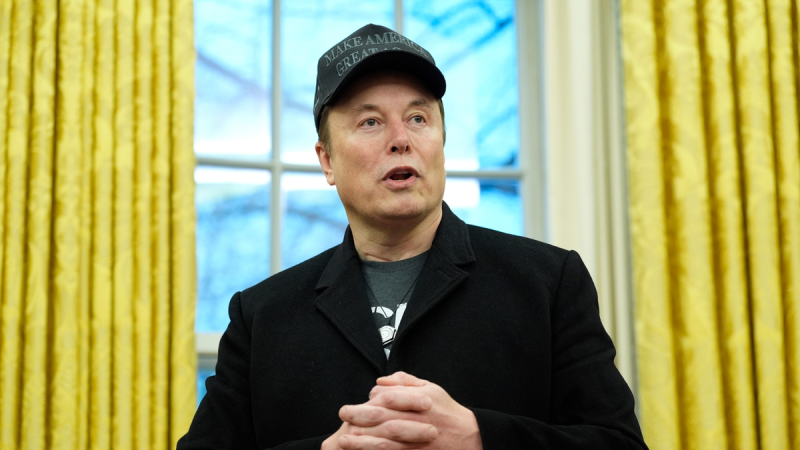
During Mettler-Toledo’s earnings call earlier this month, executives found themselves fielding a barrage of questions about one key topic: tariffs.
The Ohio-based maker of industrial scales and laboratory equipment had already opened the call by breaking down the expected impact from President Donald Trump’s still-evolving trade policy. But when the event transitioned to the question-and-answer portion, the inquiries from analysts seeking further detail about potential tariffs were constant.
“Uncertainty remains across many of our core markets and the global economy,” Finance Chief Shawn Vadala said on the Feb. 7 call. “Geopolitical tensions remain elevated, and include the potential for new tariffs that we have not factored into our guidance.”
Mettler-Toledo’s experience wasn’t unique. America’s largest companies are getting inundated with queries about how or if Trump’s salvo of promises on issues ranging from international trade to immigration and diversity will alter businesses.
A CNBC analysis shows multiple core themes tied to Trump’s policies are popping up on the earnings calls of S&P 500-listed companies at an increasing clip. Take “tariff.” Just weeks into the new year, the frequency of the word and its variations on earnings calls hit its highest level since 2020 — the last full year of Trump’s first term.
On top of that, new acronyms and phrases, like the “Gulf of America” or “DOGE,” have found their way into these meetings as the business community assesses what Trump’s return to power means for them.
Curiously, Trump himself wasn’t racking up mentions on these calls. Many uses of the word “trump” in transcripts reviewed by CNBC referred to the verb, rather than the president.
Still, a review of call transcripts shows how key words tied to Trump’s policies have quickly become commonplace. With the first earnings season of 2025 more than 75% complete, the comments offer an early glimpse into how these companies view the new administration.
One of the most talked about policies has been Trump’s tariff plans. The president briefly implemented — and then postponed — 25% taxes on imports to the U.S. from Mexico and Canada. He also separately slapped China with a 10% levy and imposed aluminum and steel tariffs. Then, on Thursday, he discussed a plan to impose retaliatory tariffs on other trading partners on a country-by-country basis.
Given the uncertainty, it’s no surprise tariffs are a hot topic. The topic has come up on more than 190 calls held by S&P 500 companies in 2025, putting it on track to see the highest share in half of a decade.
The frequency picked up late last year as Trump’s return to the White House became clear. About half of calls in 2024 that mentioned forms of the word took place in the fourth quarter, according to a CNBC analysis of data from FactSet, a market research service.
“Studying tariffs has been at the top of the list of things that we’ve been doing,” said Marathon Petroleum CEO Maryann Mannen on the energy company’s Feb. 4 earnings call.
Several companies said they were not factoring potential impacts from these levies into their guidance, citing uncertainty about what orders will actually go into place. Others just aren’t sure: At Martin Marietta Materials, CFO James Nickolas said the supplier’s profits could either benefit or take a hit from tariffs depending on what form ultimately takes effect.
While Generac didn’t calculate how these import taxes could affect future performance, CEO Aaron Jagdfeld said the generator maker is ready to mitigate the financial hit by reducing costs elsewhere and raising its prices. Camden Property Trust CEO Richard Campo said a company analysis shows proposed tariffs would push up costs for materials from Canada and Mexico like lumber and electrical boxes. These comments offer support to the idea that Trump’s tariffs may drive up consumer prices and fan inflation.
Zebra Technologies CFO Nathan Winters said price increases could help mitigate profit pressure. Auto parts maker BorgWarner, meanwhile, anticipates another year of declining demand in certain markets, which CFO Craig Aaron attributed in part to potential headwinds from these levies.
Cisco’s R. Scott Herren agreed with other executives on the lack of clarity, describing the tariff situation as “dynamic” on the networking equipment maker’s earnings call last week. Still, the CFO said the company has planned for some variation of Trump’s tariff proposals to take effect and is expecting costs to increase as a result.
“We’ve game planned out several scenarios and steps we could take depending on what actually goes into effect,” he said.
The topic of immigration, meanwhile, has already come up on the highest share of calls since 2017.
Trump has promised mass deportations of undocumented immigrants during his second term in office. Cracking down on immigration has been a core component of Trump’s political messaging since he ran in part to “build the wall” between the U.S. and Mexico for his first term. Critics assert that his plans would shock the labor market and could result in higher inflation.
Immigration mentions tend to tick up during the first year of a new administration, CNBC data shows. But 2025 has surpassed the first years of Joe Biden’s presidency and Barack Obama’s second term, underscoring Trump’s role in elevating the issue within U.S. businesses.
Some companies grouped immigration with tariffs as drivers of broader unpredictability within the economy. Nicholas Pinchuk, CEO of toolmaker Snap-On, described anecdotes of strong demand for repair services from its clients, but said they were still stressed by red flags in the economic backdrop.
“It’s clear the techs are in a good position. But that doesn’t make them immune to the macro uncertainty around them: ongoing wars, immigration disputes, lingering inflation,” Pinchuk said. “Although the election is in the rear mirror and the new team may be more focused on business expansion, there’s a rapid fire of new initiatives. … It’s hard not to be uncertain about what’s up.”
Firms in a variety of sectors took questions about what changes in the composition of America’s population would mean. AT&T, Verizon and T-Mobile all fielded questions about whether a slowdown in immigration would hurt demand for certain phone plans. Michael Manelis, operations chief at apartment manager Equity Residential, said in response to an immigration-related inquiry that it hasn’t seen any upticks in lease breaks from tenants being deported.
In the Southern California market, real estate developer Prologis CEO Hamid Moghadam said deportations can decrease the pool of workers and, in turn, drive up employment costs in the region. That can exacerbate pricing pressures already expected as the Los Angeles community rebuilds in the wake of last month’s wildfires.
Other businesses insisted deportations wouldn’t create labor shortages for their operations because all of their workers are legally authorized. One such company, chicken producer Tyson Foods, said it hasn’t had factories visited by U.S. Immigration and Customs Enforcement or seen any declines in worker attendance.
“We’re confident that we’ll be able to continue to successfully run our business,” CEO Donnie King said on Feb. 3.
Topics that gained newfound relevance with Trump’s return to office have also already started emerging.
DOGE — the acronym for the new Department of Government Efficiency led by Tesla CEO Elon Musk — has been mentioned on more than 15 calls, as of Friday morning. This department has put Wall Street on alert as investors wonder if contracts between public companies and federal agencies could be on the chopping block with Musk’s team slashing spending.
Iron Mountain’s mine that stores government retirement records was ripped as an example of inefficiency by Musk during a visit to the Oval Office. But surprisingly, CEO Bill Meaney said the push for streamlining can actually benefit other parts of its business.
“As the government continues to drive to be more efficient, we see this as a continued opportunity for the company,” he said last week.
Executives at Palantir, the defensive technology company that was a top performer within the S&P 500 last year, are similarly hopeful. Technology Chief Shyam Sankar described Palantir’s work with the government as “operational” and “valuable,” and is hopeful that DOGE engineers will be “able to see that for a change.”
“I think DOGE is going to bring meritocracy and transparency to government, and that’s exactly what our commercial business is,” Sankar said during the company’s Feb. 3 call. “The commercial market is meritocratic and transparent, and you see the results that we have in that sort of environment. And that’s the basis of our optimism around this.”
He noted some concerns among other government software providers, and called those agreements “sacred cows of the deep state” during the call.
Elsewhere, the so-called Gulf of America has been a point of divergence after Trump’s executive order renaming what has long been known as the Gulf of Mexico. Chevron used the moniker Gulf of America repeatedly in its earnings release and on its call with analysts late last month. But Exxon Mobil, which held its earnings call the same day, opted instead to refer to the body of water as the Gulf of Mexico.
This post appeared first on NBC NEWS






















